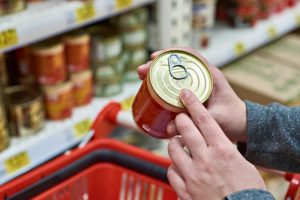A growing number of major UK supermarket chains are removing ‘best before’ dates from many fresh fruit and vegetable products in an effort to reduce food waste.
Asda, Tesco, Sainsbury’s, Marks & Spencer, Waitrose and Co-op have each begun phasing out the labels on selected produce such as apples, potatoes, citrus and salad vegetables. The move follows guidance from the government-backed Waste and Resources Action Programme (WRAP), which says that scrapping date labels from uncut fruit and vegetables could prevent thousands of tonnes of perfectly edible food from being thrown away every year.
WRAP research has shown that many households confuse ‘best before’ dates, which indicate when food is at its best quality, with ‘use by’ dates, which mark when food may no longer be safe to eat. As a result, millions of items are discarded while still fit for consumption.
‘Use by’ dates remain compulsory on foods that pose a higher safety risk, such as meat, dairy and ready meals. These indicate the final day on which food can be safely eaten, cooked or frozen. By contrast, ‘best before’ dates are about quality, not safety, and appear mostly on products such as bread, rice, tins and dried goods.
Marks & Spencer has removed best before dates from about 85 per cent of its fresh produce, while Waitrose has dropped them from nearly 500 lines. Some retailers are instead using small printed codes visible to staff for stock rotation and freshness checks.
Food safety expert Dr Richard Anderson of High Speed Training said that while ‘use by’ dates should always be observed, ‘best before’ guidance can be treated more flexibly. “Best before dates are an indication of quality rather than safety. You can still eat food after its best before date, but its flavour and texture may not be as good as before the date,” he said.
WRAP encourages consumers to rely more on sight, smell and touch to judge whether fruit and vegetables remain good to eat. The organisation says there is no legal requirement in the UK to label uncut produce with a ‘best before’ date.
According to WRAP, the average UK household wastes the equivalent of eight meals a week, with 4.5 million tonnes of edible food thrown away annually. The removal of best before dates is part of a wider drive across the food retail sector to tackle avoidable waste and reduce environmental impact.
Some critics warn, however, that removing dates altogether may cause confusion for some shoppers or make them more cautious, leading to continued waste. Others say the change puts greater responsibility on consumers to decide what is still edible.
The UK government’s food waste reduction roadmap aims to halve national food waste by 2030 in line with UN sustainability goals. Industry groups say supermarket labelling reforms are a practical step towards achieving that target.
In Surrey, FareShare Sussex & Surrey plays a key role in reconnecting surplus food with those who need it. The charity rescues safe, in-date food from farms, retailers and producers and redistributes it to charities, community groups, food banks, pantries and other support services. In 2024, FareShare opened a new depot in Surrey to handle more fresh, chilled and frozen food for redistribution across the region.
Locally, Epsom & Ewell Foodbank, part of Good Company Surrey and the Trussell Trust network, distributed almost 8,000 emergency food parcels last year to people in crisis. The network serves Epsom, Ewell, Banstead, Leatherhead and Tadworth through a voucher referral system and provides three days of nutritionally balanced food to those referred. It operates from local church halls and community centres, with donation points in major supermarkets and strong support from volunteers.
Epsom & Ewell Borough Council also promotes “Help with Food” schemes, directing residents to emergency support and a community pantry in Epsom that offers fresh fruit, vegetables and store cupboard items for a small weekly subscription.
Jonathan Lees, Good Company’s Managing Director and Founder told the Epsom and Ewell Times: ‘At Good Company, both our food provision projects, Foodbanks and Pantries, are very grateful for the food surplus we receive from local supermarkets. These donations ensure there is variety in our offer and are a very welcome addition to the ambient food donations. We offer the food on a help yourself basis to people that use our projects ensuring that there is some for all. If dates were removed, then we would need to look at how we used the food under appropriate guidance and of course less waste would mean we could have less to offer people in need.’
As supermarkets adapt their labelling to cut national food waste, the efforts of local redistribution organisations such as FareShare Sussex & Surrey and Epsom & Ewell Foodbank remain vital in ensuring surplus food finds its way to those who need it most.

Image courtesy High Speed Training


